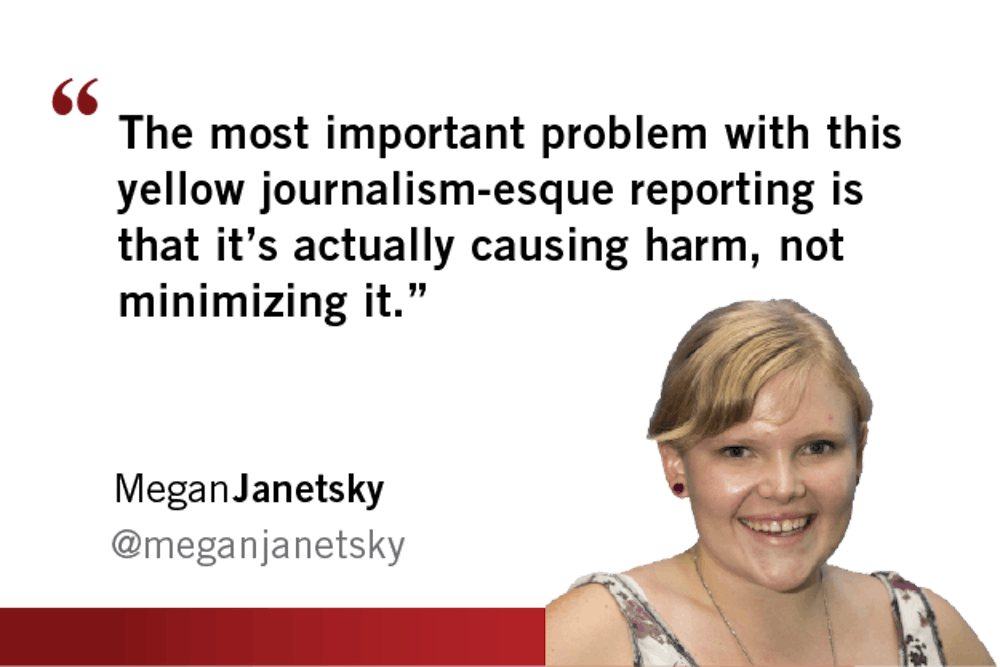Ebola: an airborne, apocalyptic plague that has slowly oozed its way into the bodies of Americans.
At least that’s what mainstream media networks seem to think it is.
A recent New Jersey poll revealed that people who claimed to follow the Ebola story more closely were actually the most misinformed — that is, the more they believed they were educating themselves about the disease, the less they actually knew about it.
The poll also revealed that three out of four people polled were concerned that people with Ebola will spread the disease without actually showing symptoms. That means that 75 percent of the people who watched the news got a critical fact completely wrong.
This is no doubt a byproduct of the increased value modernized (primarily televised) media places on sensationalism. Instead of getting even-headed experts explaining the issue as a whole, media networks consult amateurs who feed the public’s concerns and stir up fear.
The best example of this is CNN’s recent guest Robin Cook, a sci-fi author who wrote a 1987 book called “Outbreak,” detailing an Ebola epidemic hitting the U.S. The author “speculated” the future of the virus, raising concerns about it going airborne. Basically, Cook — introduced as the Man Who Wrote the Book On Ebola — was there to validate completely invalid concerns and give the station something with which to raise fear. Using a sci-fi author to offer advice on Ebola basically equates to having a "Grey’s Anatomy" actor diagnose you with cancer.
Earlier that week, CNN also made a connection between ISIS and Ebola, and Fox News journalist Elisabeth Hasselbeck didn’t just suggest, but demanded that we stop all international travel and put the country on lockdown. Fox also went on record promoting a conspiracy theorist. And those are only the major news outlets.
As exaggeration runs rampant in the media, celebrities and public figures begin to raise their voices in the Ebola conversation, with figures like Jenny McCarthy, Playboy model and apparently now medical expert, contributing their opinions. McCarthy claimed that an abundance of lemon juice is the cure for Ebola. These many variations of misinformation form a deadly combination of stupidity and large audiences.
Clearly the news media is playing on the fears of the people. This over-dramatization of the news became so bad in fact, that when a Fox journalist actually did his job and reported the facts in a clear, unbiased way, he got showered with praise. This is something all news networks should be doing, especially the mainstream media.
The most important problem with this yellow journalism-esque reporting is that it’s actually causing harm, not minimizing it. Ebola entering America should only be a minor concern, not one borderlining on apocalyptic hysteria, not a concern so high that countless politicians are genuinely considering shutting down travel to Africa.
The real issue is not Ebola in America; it’s Ebola in Africa and other third world countries that lack the medical supplies to treat it. More than 4,500 people have died of Ebola, and the lion's share of those deaths took place in West Africa, but instead of focusing on thousands of helpless lives being lost, the media focused on what-ifs in America. By taking the spotlight off an incredibly critical issue, the media is, at best, helping to further grow the giant number of lives taken by the disease.
The problem is that audiences assume it’s an “America” problem based on the inadequate news coverage, but it’s more of a humanity problem.
The point of the media as a whole is to provide a unbiased, informative explanation about what is going on in the world. What the public is getting instead is over-exaggeration and fiction. That’s not journalism, that’s just spreading rumors just like a high school student.
Reach the columnist at mjanetsk@asu.edu or follow her on Twitter @meganjanetsky
Editor’s note: The opinions presented in this column are the author’s and do not imply any endorsement from The State Press or its editors.
Want to join the conversation? Send an email to opiniondesk.statepress@gmail.com. Keep letters under 300 words and be sure to include your university affiliation. Anonymity will not be granted.
Like The State Press on Facebook and follow @statepress on Twitter.





